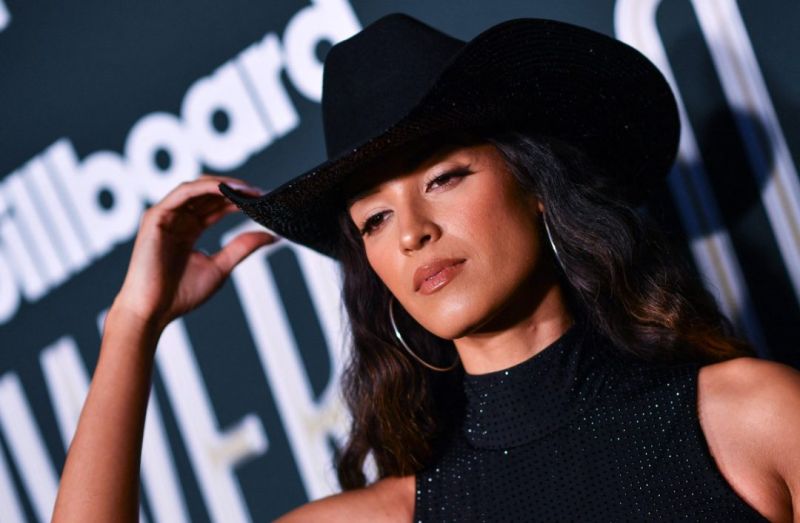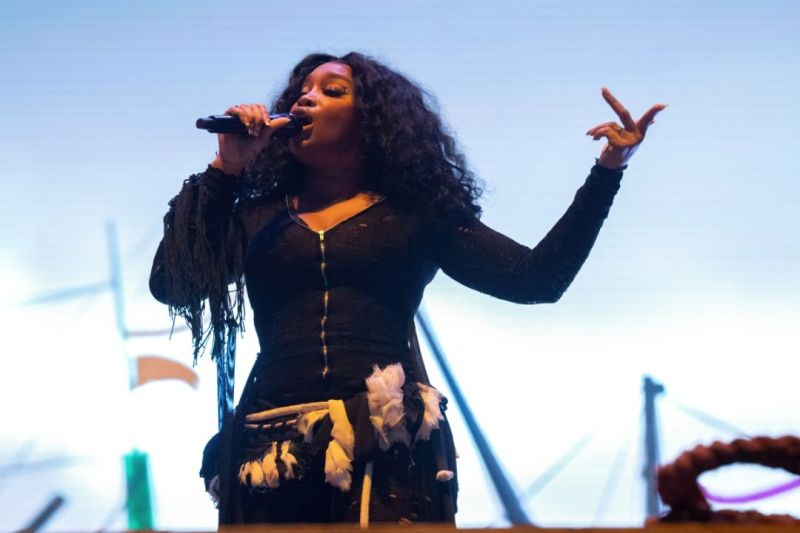
©US singer Miley Cyrus performing on stage during a concert at the Sunny Hill Festival in Pristina Kosovo on August 2 2019.
Photo Credit: Armend Nimani / AFP
At the Grammy Awards’ forthcoming ceremony, an unprecedented majority of the nominations for Album and Record of the Year have been awarded to female or gender-fluid artists, including notable figures such as Taylor Swift, SZA, and Olivia Rodrigo. This shift is perceived by many observers of the industry as a long-overdue rectification.
 Billie Eilish performing during the 62nd Annual Grammy Awards on January 26 2020 in Los Angeles.
Billie Eilish performing during the 62nd Annual Grammy Awards on January 26 2020 in Los Angeles.
Photo Credit: Robyn Beck / AFP
In recent years, the Grammy Awards have faced criticism for their apparent oversight of female artists' contributions to music. However, the current year represents a pivotal moment in rectifying this imbalance, with women poised to secure the evening's most coveted accolades. Kristin Lieb, a professor at Emerson University with a focus on entertainment marketing, music, and gender studies, remarked on the transformation within the discourse surrounding the Grammys. "Women pop stars have gone from owning the red carpet discussion to owning the entire Grammys discussion," Kristin Lieb stated in an interview with AFP. She highlighted a significant evolution in the narrative, now emphasizing the artists' talent and charisma over their physical appearance and fashion choices.
 US singer-songwriter Moriah Peters attending the Billboard Power 100 event at NeueHouse Hollywood in Los Angeles on January 31 2024.
US singer-songwriter Moriah Peters attending the Billboard Power 100 event at NeueHouse Hollywood in Los Angeles on January 31 2024.
Photo Credit: Valerie Macon / AFP
Among the frontrunners for Grammy recognition in both the album and record categories are Swift, SZA, and Rodrigo, who are joined by Miley Cyrus and the indie supergroup boygenius. Additionally, Janelle Monae, Lana Del Rey, Billie Eilish, and emerging talent Victoria Monet have garnered nominations, with Jon Batiste being the only male artist nominated for both awards, marking a stark contrast to previous years.
The inclusion of artists identifying as gender fluid or queer, such as members of boygenius, Miley Cyrus, Billie Eilish, and Janelle Monae, underscores the broader representation achieved in this year's nominations. This is a notable departure from the historical trend identified by the Annenberg Inclusion Initiative at the University of Southern California, which reported that over the decade from 2012 to 2022, a mere 13.9 percent of major category nominees were women.
 US filmmaker and model Leah Talabi attending the Billboard Power 100 at NeueHouse Hollywood in Los Angeles on January 31 2024.
US filmmaker and model Leah Talabi attending the Billboard Power 100 at NeueHouse Hollywood in Los Angeles on January 31 2024.
Photo Credit: Valerie Macon / AFP
The commentary by former Recording Academy CEO Neil Portnow, who controversially suggested that female artists should "step up" to gain recognition, now stands in stark contrast to the achievements of the past year. The industry has witnessed remarkable successes, particularly among women of color on the Billboard top songs chart, as evidenced by the latest Annenberg figures. Harvey Mason Jr., the current Academy chief, attributed the success of female artists this year to the undeniable quality of their music, as acknowledged by the Grammy voters. The diversity in genre and style among the nominated women challenges the traditional categorization of female artists under the generic "pop" label, encouraging a reevaluation of women's contributions to music across various genres.
 US singer-songwriter SZA performing during Austin City Limits Festival at Zilker Park on October 7 2022 in Austin Texas.
US singer-songwriter SZA performing during Austin City Limits Festival at Zilker Park on October 7 2022 in Austin Texas.
Photo Credit: Suzanne Cordeiro / AFP
Professor Lieb expresses cautious optimism regarding the evolving perception of pop music and female artists within the industry and among critics and academics alike. Meanwhile, Christine Wisch, a classically trained musicologist at Indiana University, envisions a future where artistic merit transcends gender, allowing for an unbiased appreciation of music. Her students, who admire the band boygenius for their refusal to be confined by the "women in rock" label, echo this sentiment, aspiring to a time when gender will no longer predicate discussions of musical achievement.
With AFP.
 Billie Eilish performing during the 62nd Annual Grammy Awards on January 26 2020 in Los Angeles.
Billie Eilish performing during the 62nd Annual Grammy Awards on January 26 2020 in Los Angeles.Photo Credit: Robyn Beck / AFP
In recent years, the Grammy Awards have faced criticism for their apparent oversight of female artists' contributions to music. However, the current year represents a pivotal moment in rectifying this imbalance, with women poised to secure the evening's most coveted accolades. Kristin Lieb, a professor at Emerson University with a focus on entertainment marketing, music, and gender studies, remarked on the transformation within the discourse surrounding the Grammys. "Women pop stars have gone from owning the red carpet discussion to owning the entire Grammys discussion," Kristin Lieb stated in an interview with AFP. She highlighted a significant evolution in the narrative, now emphasizing the artists' talent and charisma over their physical appearance and fashion choices.
 US singer-songwriter Moriah Peters attending the Billboard Power 100 event at NeueHouse Hollywood in Los Angeles on January 31 2024.
US singer-songwriter Moriah Peters attending the Billboard Power 100 event at NeueHouse Hollywood in Los Angeles on January 31 2024.Photo Credit: Valerie Macon / AFP
Among the frontrunners for Grammy recognition in both the album and record categories are Swift, SZA, and Rodrigo, who are joined by Miley Cyrus and the indie supergroup boygenius. Additionally, Janelle Monae, Lana Del Rey, Billie Eilish, and emerging talent Victoria Monet have garnered nominations, with Jon Batiste being the only male artist nominated for both awards, marking a stark contrast to previous years.
The inclusion of artists identifying as gender fluid or queer, such as members of boygenius, Miley Cyrus, Billie Eilish, and Janelle Monae, underscores the broader representation achieved in this year's nominations. This is a notable departure from the historical trend identified by the Annenberg Inclusion Initiative at the University of Southern California, which reported that over the decade from 2012 to 2022, a mere 13.9 percent of major category nominees were women.
 US filmmaker and model Leah Talabi attending the Billboard Power 100 at NeueHouse Hollywood in Los Angeles on January 31 2024.
US filmmaker and model Leah Talabi attending the Billboard Power 100 at NeueHouse Hollywood in Los Angeles on January 31 2024.Photo Credit: Valerie Macon / AFP
The commentary by former Recording Academy CEO Neil Portnow, who controversially suggested that female artists should "step up" to gain recognition, now stands in stark contrast to the achievements of the past year. The industry has witnessed remarkable successes, particularly among women of color on the Billboard top songs chart, as evidenced by the latest Annenberg figures. Harvey Mason Jr., the current Academy chief, attributed the success of female artists this year to the undeniable quality of their music, as acknowledged by the Grammy voters. The diversity in genre and style among the nominated women challenges the traditional categorization of female artists under the generic "pop" label, encouraging a reevaluation of women's contributions to music across various genres.
 US singer-songwriter SZA performing during Austin City Limits Festival at Zilker Park on October 7 2022 in Austin Texas.
US singer-songwriter SZA performing during Austin City Limits Festival at Zilker Park on October 7 2022 in Austin Texas.Photo Credit: Suzanne Cordeiro / AFP
Professor Lieb expresses cautious optimism regarding the evolving perception of pop music and female artists within the industry and among critics and academics alike. Meanwhile, Christine Wisch, a classically trained musicologist at Indiana University, envisions a future where artistic merit transcends gender, allowing for an unbiased appreciation of music. Her students, who admire the band boygenius for their refusal to be confined by the "women in rock" label, echo this sentiment, aspiring to a time when gender will no longer predicate discussions of musical achievement.
With AFP.
Read more



Comments